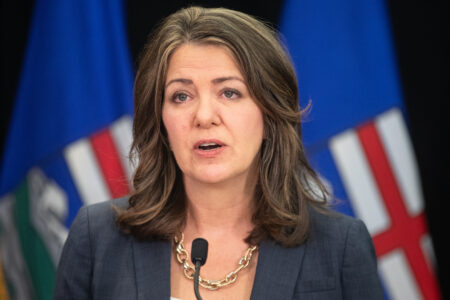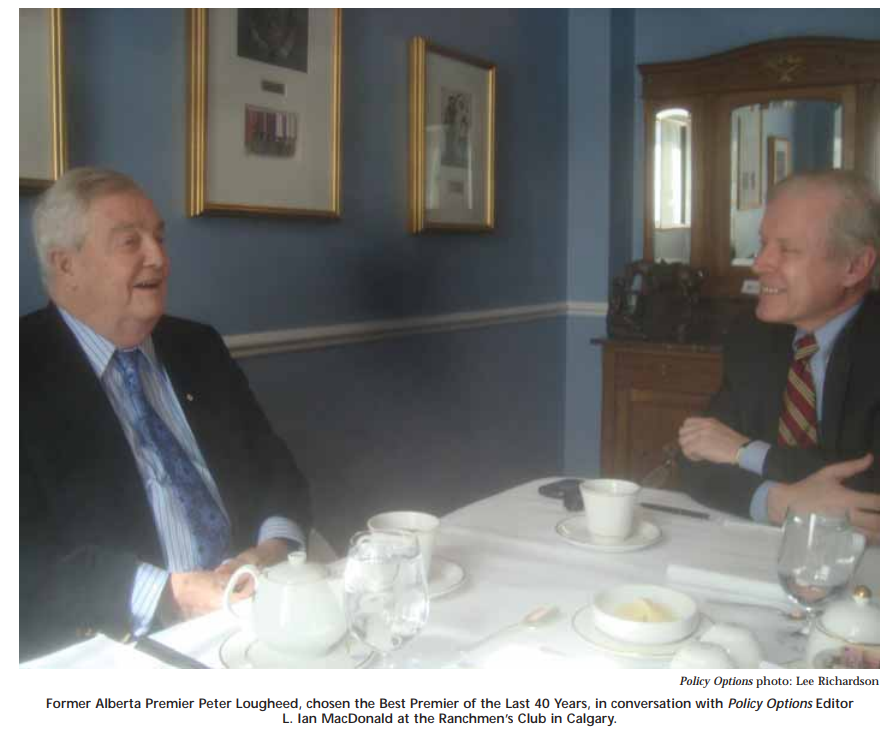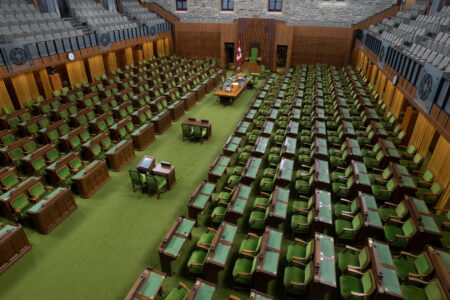
POLICY OPTIONS: Well, Mr. Premier, as I still call you, thank you for doing this.
PETER LOUGHEED: Delighted and honoured.
PO: As you now know, you are the winner of our survey as part of the 40th anniversary of the Institute for Research on Public Policy of the Policy Options survey for the Best Premier of the Last 40 Years. Congratulations.
PETER LOUGHEED: Well, thank you; I’m honoured by that.
PO: As I’ve said to other people, watching these results as they came in and tabulating them from our jury of 30 very distinguished Canadians was like watching Secretariat win the Belmont by 31 lengths, because you were the top pick of 21 out of the 30 jurors, who picked you as best premier. You were in the top 5 of all 30 jurors, and in terms of our in-depth questionnaire, the nine leadership attributes that we tested, you won on all nine of them.
PETER LOUGHEED: Wow.
PO: So it was a landslide. Congratulations.
PETER LOUGHEED: I’m honoured.
PO: Did you ever think, when you left office in 1985, “How will I be remembered”?
PETER LOUGHEED: I thought a lot about it, and I wanted to be remembered as a person who, in a period of those years in office, accomplished some very major matters, matters that we had put in our platform and that we said we would do. And we followed our platform by implementing these measures, which were our priorities.
PO: When you were there in the moment, you obviously saw yourself as a big-picture guy, right?
PETER LOUGHEED: Right.
PO: And you wanted to do big things; you left the micro-management to other people.
PETER LOUGHEED: Well, that’s true to a degree, except in certain areas. There were some areas where I was fully involved, like in the Constitution; I was involved in all the details of that. Because I did that, I had to take some of the other areas, such as what we might call government services, or some of the utility factors, and I had to delegate them more extensively. In short, my delegation varied by the nature of the portfolio.
PO: In other words, the top files were on your desk.
PETER LOUGHEED: That’s right.
PO: Let me run through with you the nine attributes in our survey and you can comment on the relative importance of each of them. First of all, winnability and communication skills. You brought in a party that had been in opposition for 40 years and began a dynasty that has now been in government for 40 years.
PETER LOUGHEED: Well, I think it goes to television, because we were in the early days of television. And as part of our campaign strategy we had to figure out how to use television effectively; and those were early days for that. And I developed an ability to do what I called “the two-minute clip” and “the 30 second clip.” And we learned how to do it, and how to do it with timing, and I think it became one of the attributes that really helped us.
PO: And then federal-provincial relations and interprovincial relations, the relationship with Ottawa and with your fellow premiers.
PETER LOUGHEED: Well, that was very crucial because out we started right at the outset having a minister of federal and intergovernmental affairs. The only other province that had done that before was Quebec. But it became really important to us in Alberta to give that priority. It wasn’t so much taking away from the premier as it was having a whole department under a minister, a senior minister. The first one was Don Getty, who was right on top of all of the issues that were involved.
And as a result of that we would go — and I don’t think this is boasting — but we would go to federal-provincial conferences and premiers’ conferences over those years as well-prepared if not better than anybody else.
PO: In fact the famous Alberta-Quebec alliance began with Lougheed and Bourassa.
PETER LOUGHEED: That’s right, it did.
PO: What they call a rapport des forces.
PETER LOUGHEED: Yes, it did. We started by recognizing that Quebec had real experience in the federal-provincial field because they had this department, and they had it before us. And we learned from them; we learned a lot from them. I worked closely with them over the years.
PO: And the importance of fiscal frameworks and the economy for a premier.
PETER LOUGHEED: Well, at the very outset, one of the important things that we had to do, and we wanted to do, was to make sure that there was a real balance in terms of the fiscal framework within Canada, between the provinces, and between them and the federal government. And that was one of our priorities from the outset, was to have a relationship, a fiscal relationship, which put the provinces in a position where they could count on their revenues and were not too much — although we still were to some degree under the auspices of the federal government.
PO: Then infrastructure in the broad sense, particularly health and education, the big two.
PETER LOUGHEED: Well, I think we gave priority in our own campaigns to health and education. But education was a real key factor for our government from the outset, and the education minister — the first one was Lou Hyndman — and we developed, made a decision early when we were elected, to divide education into two parts.
PETER LOUGHEED: We had a minister of advanced education, Jim Foster, who went on to be an outstanding judge; and we had Lou Hyndman in the basic education system. But I think the really crucial decision in forming that cabinet was that we had a division between the minister of education and the minister of advanced education and from that we built the college system.
It also included the Southern and Northern Institutes of Technology, which is really important — the technology schools — in terms of what Alberta accomplished. So we had the technology schools, the colleges and the universities, all under one minister of advanced education, who was Jim Foster. And then in that first cabinet we had all of the other basics under Lou Hyndman, and that included all things such as development of the curriculum.
PO: When you look at the University of Alberta and the University of Calgary, to take just two examples, you’re looking at two worldclass universities. You must be very proud of that.
PETER LOUGHEED: We are proud of that, but we’re also proud of universities like the University of Lethbridge, and we’re also proud of the fact that we’ve got an advanced education approach with people who will take advanced learning as well. So that’s all been good.
PO: What gives you the most satisfaction the among achievements of your 14 years in office?
PETER LOUGHEED: That we were able to work with large majorities as a team, and we functioned as a team. And I think the secret of that was the way we handled caucus. We made it abundantly clear — and this is, I think, very distinctive in Canada — we made it abundantly clear that our decisions were made by caucus and not by cabinet. And it was a fundamental thrust of our government.
Why did we do that — it’s different from most of the governments. We did it because if you look at the logic of how we become the government, why are we the government? We’re the government because we’re the party that has the most seats. That means the caucus, not the cabinet. And it was my determination and the determination of others that the caucus would be dominant over the cabinet.
And there were times when the caucus would overturn the view of the cabinet. Of all the things that we did, I rate that very near the top.
PO: You were known as someone who always stood up for the interests of Alberta, but at the end of the day you were a Canadian first, and I think the 1981-82 Constitution file is the big storyline there, is it not?
PETER LOUGHEED: But that was what Albertans were. We were reflecting our province. We were not perceived that way, we were perceived in many ways as being very much a government that was Albertan before it was Canadian. But that wasn’t our caucus and that wasn’t our party.
Our party was very much involved with the position that we were Canadians before we were Albertans. And we repeated endlessly, at speeches and in other events, that the issue that the party had, which is that we were Canadians before we were Albertans. And that, then, reflected the view of the caucus.
PO: Wasn’t the dealmaker in 1981 — November 4-5, 1981 — the not withstanding clause, which you and others had put forward?
PETER LOUGHEED: That’s right. One of the most significant events in my life was, of course, the ultimate constitutional result, which brought in the notwithstanding clause. To those who are not familiar with it, this means that if a law is passed by the federal Parliament, under the Constitution that we then established, if a province, such as Alberta, doesn’t want to be part of it, they can pass a specific resolution in their legislature that that particular law will have no impact on the people of Alberta. And the phrase we used was “notwithstanding the federal law.”
PO: In fact, while it threatens to fall into disuse federally because it’s never been invoked, you used it yourself a couple of times.
PETER LOUGHEED: That’s right; but it’s always been there.
PO: The National Energy Program. You said one time: Where Mr. Trudeau had been on your front porch, you now found him in your living room.
PETER LOUGHEED: [Laughs] Well, I think the National Energy Program was one of the worst mistakes of the Trudeau regime. I don’t think they understood the nature of Canada to think that with a constitution where the ownership of resources rested with the provinces, that they could in fact pass by the Parliament of Canada with their majority a procedure such as the National Energy Program, which would transfer ultimate ownership or attempt to transfer ultimate ownership of natural resources from the provinces to the federal government. PO: If I could just come back to our survey and ask you to comment on the premiers that you knew who have also finished in the top five: William Davis, Allan Blakeney and Robert Bourassa were colleagues and contemporaries of yours.
Well, I think the National Energy Program was one of the worst mistakes of the Trudeau regime. I don’t think they understood the nature of Canada to think that with a constitution where the ownership of resources rested with the provinces, that they could in fact pass by the Parliament of Canada with their majority a procedure such as the National Energy Program, which would transfer ultimate ownership or attempt to transfer ultimate ownership of natural resources from the provinces to the federal government.
PETER LOUGHEED: Well, each one of them is a wonderful story. Let me deal with Bill Davis first. I think the most startling part of the Bill Davis story was that when he came out to try to convince me with regard to natural resources, and he flew out as an Ontario premier to see the premier of Alberta.
And that was a remarkable story that the media had a great time with. But we developed a great friendship, even though we took quite different positions. And the story that I like to tell — the amusing story I like to tell — was once we were at a federal-provincial conference in Ottawa. I can’t remember quite the background of it, but it was at Rideau Hall.
It was going on endlessly, and I stood up and nodded to Bill Davis; and he nodded back to me and we excused ourselves from the meeting. And everybody was of course of the view that these two and their provinces would then get together and work out the challenges between the two of them. And we went back to Bill’s hotel room and watched Monday Night Football.
PO: And Allan Blakeney was a socialist who balanced his budgets.
PETER LOUGHEED: He and I became great friends, because there were so many things that Alberta and Saskatchewan worked on together, including the Western Economic Opportunity conferences and other matters. But I think what was remarkable about the Peter Lougheed-Allan Blakeney relationship was the respect we had for each other.
A wide difference of political philosophy — philosophical views — but I admired so much his brilliance, his intelligence. He was always right at the very forefront of discussions at federal-provincial conferences. He was so respected by all the other premiers when he spoke. He was an exceptional man, and I was honoured to speak about him when I went to his memorial service not too long ago.
PO: Robert Bourassa, with whom you struck up a good relationship too.
PETER LOUGHEED: Well, the Peter Lougheed-Robert Bourassa relationship was an exceptional one because it was clear that Trudeau was trying to dominate Mr. Bourassa, and Mr. Bourassa was standing up for the positions of Quebec. And we found ourselves in the same position because of the whole provincial rights issue. And he and I, Mr. Bourassa and I, because Quebec had a very, very intelligent department of intergovernmental affairs with exceptionally good people, because of that relationship we had, we were able to work very closely with Mr. Bourassa and his administration over a lot of important years and a lot of important conferences.
PO: I kind of skipped over Frank McKenna because he was from the next generation, but would you care to comment on him?
PETER LOUGHEED: Well, Frank McKenna was after the end of my term, but I think the most amusing part of Frank McKenna was the phone call that I got from him, where he said, “I beat you.” And we had these huge majorities and Frank McKenna phoned me and said that we elected more members and we beat the Conservative record of the number of members by the governing party.
And that, of course, I was always taken with Frank McKenna’s abilities. And later on I worked with him when he was in Washington.
PO: When you took office in 1971 the GDP per capita in Alberta was $17,000. When you left office in 1985 it was $50,000 per person.
PETER LOUGHEED: Wow. I never heard those figures before.
PO: And the price of oil, was somewhere between $2 and $3 in 1971; it was $28 when you left office. And it is $100 today.
PETER LOUGHEED: When I look at the price of oil I look at it primarily in those days when we started…because it was quite low; your figure was $2, was it? We ran into the whole development, which was good fortune for us, of the Organization of Petroleum Exporting Countries, OPEC.
PO: Tripling their prices overnight in 1973.
PETER LOUGHEED: Tripling their prices overnight. It was a very fortuitous thing for Alberta, but what it permitted us to do as a petroleum producing area, and it had manifest implications positively for our province and its economy and its financial position, was that we were then getting such significantly higher value for a depleting resource. I never felt defensive about that because the whole issue to me is that, it is a depleting resource, and you had to manage the resource in a way of recognizing that with its depletion it would fade away.
And that is still, even today, a problem for Alberta; not to the same degree, because of the oil sands, but there’s still a depletion factor, and because of the way we’ve set up our tax laws and the recognition of depletion within the tax laws, is a recognition that you have to look at oil and natural gas as a depleting and declining resource. And you have to manage the resource and that means to manage it with good public policy.
PO: The Alberta Heritage Fund, which you created and established, was at about $12 billion when you left office. It’s not a whole lot more than that today.
PETER LOUGHEED: Well that, you really get me to stress out when you say that — and you knew you would with your question. I think that’s one of the poorest management factors of the Klein administration, and I’ve been public about that. They didn’t put the money away the same way we did, and yet we had tremendous public support from the people of Alberta with the Heritage Savings Trust Fund.
And the important word in that is it’s trust. And the public of Alberta have been as strong as the government in terms of the concept of supporting the principle that we should be putting aside a very significant percentage of the revenues from natural resources into a trust fund. That was one of my great satisfactions in government, was to have the people of Alberta as supportive as they were about the whole concept of the trust fund.
PO: Let me ask you about pipelines as transport levers for the oil sands, both to the United States and Asia Pacific. I think you’ve been a little critical of the pipeline option as opposed to building more refinery capacity here at home.
I’m very positive about Alison Redford. I’ve visited with her on a couple of occasions, and I think I’ve helped her with the questions of candidates and the emphasis on candidates. But she delights me in the sense that she’s forward looking, and she’s thinking ahead about the province and trying to balance that.
PETER LOUGHEED: What I’ve been public about is that if I were premier today — and you’ve got to be careful when you do that — I would process much more of the oil sands within Alberta, which would produce a multitude of jobs.
And I’ve had some pretty considerable support about that by the public at large. I’ve tried to be careful when I get into these current issues, because it has an impact upon the current administration when I do that. But this is one where I felt strongly enough to have been public about it, and will continue to be public about it, that I think we should be processing the bitumen from the Alberta oil sands within Alberta and creating the jobs east of Edmonton and in that area there.
And I think that would be, from a political and from an economic point of view, the right public policy for Alberta.
PO: Let me ask you about the new Premier of Alberta, Alison Redford, because it seems to me that for the first time since the Lougheed years, Alberta is back in a major leadership role in the Canadian federation.
PETER LOUGHEED: Well, I’m very positive about Alison Redford. I’ve visited with her on a couple of occasions, and I think I’ve helped her with the questions of candidates and the emphasis on candidates. But she delights me in the sense that she’s forward looking, and she’s thinking ahead about the province and trying to balance that.
She’s had some difficulties that she’s dealing with, but in my opinion she has a whole attitude that I think is very good with regard to Alberta and its future. And I think part of that is having a forward view in her own attitude of what the province should be doing.
PO: What are your thoughts on Stephen Harper, your fellow Calgarian, and how he’s doing as Prime Minister?
PETER LOUGHEED: (Laughs) Well, I — generally, of course, because I’m a Conservative, and I know others who call themselves Conservatives — I’ve been supportive of the Prime Minister. I quarrel with some of the issues that he’s involved in; some of the priorities he has. On the other hand, as a fellow Calgarian — and we visit fairly frequently — I think overall what he’s accomplished, and the way that he’s built himself into a majority government, has been a very good and positive.
And of course I’m proud of the fact that a fellow Calgarian is the Prime Minister of Canada.
PO: How have you seen him growing into the role of Prime Minister, as opposed to the job?
PETER LOUGHEED: I think that he is, both on financial matters, and that includes the minister of Finance as well, I think there are a lot of pluses that I see in what he’s accomplished and his priorities. And I’m glad that he he’s had significant time to meet many of the challenges faced in Canada. One of the areas that I’m very pleased that he’s taken a position on that and we’ve been drawn together about is trade, and particularly our trading relationships with the United States and Mexico.
And I think his approach with regard to trade generally in the world has been a very positive one as well.
PO: Finally, if you had to single out one item as your political legacy, what would it be?
PETER LOUGHEED: Attracting good candidates.
Photo: Shutterstock







